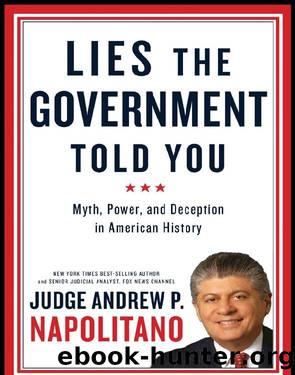Lies the Government Told You: Myth, Power, and Deception in American History by Napolitano Andrew P

Author:Napolitano, Andrew P. [Napolitano, Andrew P.]
Language: eng
Format: epub
Tags: History
ISBN: 9781595552662
Barnesnoble:
Goodreads: 6868901
Publisher: Thomas Nelson Publishers
Published: 2010-03-02T00:00:00+00:00
Lie #10
“I’m from the Government,
and I’m Here to Help.”
In a 1988 speech, President Ronald Reagan declared, “There seems to be an increasing awareness of something we Americans have known for some time: that the ten most dangerous words in the English language are, ‘Hi, I’m from the Government, and I’m here to help.’”1 That day, there was laughter when a convivial Reagan uttered the words to the Representatives of the Future Farmers of America. As is usually the case, there’s a morsel of truth within humor. Or, in this case, a big chunk of truth.
President Reagan followed up by explaining, “. . . we need to look to a future where there’s less, not more, government in our daily lives. It’s that philosophy that brought us the prosperity and growth that we see today.” In that speech, Reagan put forth his best effort to debunk the monstrous myth that the government is here to help us. The federal government has trumpeted its ability to intervene during disasters and in times of emergency but, more often than not, the result is an explosion of federal power, wasted resources, frustrating red tape, and not much else.
Washington’s fondness for creating new bureaucratic departments in response to perceived domestic problems often makes those problems much worse. If it was not such a humanitarian disaster, the federal government’s response to Hurricane Katrina in Louisiana and Mississippi in the summer and fall of 2005 would provide an almost comic example of conflicting orders, crippling bureaucracy, and inept political appointees that led to a major American city being transformed into a third-world scene of death, squalor, and chaos. From natural disasters to recalls of food and drugs once touted as safe and tested by the FDA, to staging phony press conferences, it seems the feds never defuse problems, and only spread fear and confusion. And when people are afraid and confused, they often let the government get away with telling them what to do because they don’t know what else to do.2 Perhaps the federal government is so bad at doing these things because it is institutionally incapable and constitutionally barred from these functions.
FEMA: Federal Emergency
Mismanagement Agency
In 1979, President Jimmy Carter merged several disconnected aid groups into one large agency, thereby creating the Federal Emergency Management Agency (FEMA). Yet, the new system proved to be disorganized and chaotic from the beginning. In 1985, after facing fraud allegations, FEMA Director Louis Giuffrida resigned. In 1989, after the agency’s poor handling of Hurricane Hugo in South Carolina, Senator Fritz Hollings (D-SC) commented that FEMA was the “sorriest bunch of bureaucratic jackasses I’ve ever known.”3
Conceptually, FEMA makes no sense. Why should the federal government oversee rescues from natural disasters? Wouldn’t it be more appropriate to leave these matters up to state and local governments who better understand the needs of their own people and land? As I said in my article, “Franklin Delano Bush”:
If a state government is not prudent, and a natural disaster strikes, why should American taxpayers bail it out? That would provide no incentive for prudence in the future.
Download
This site does not store any files on its server. We only index and link to content provided by other sites. Please contact the content providers to delete copyright contents if any and email us, we'll remove relevant links or contents immediately.
| Anarchism | Communism & Socialism |
| Conservatism & Liberalism | Democracy |
| Fascism | Libertarianism |
| Nationalism | Radicalism |
| Utopian |
The Secret History by Donna Tartt(16611)
The Social Justice Warrior Handbook by Lisa De Pasquale(11486)
Thirteen Reasons Why by Jay Asher(7783)
This Is How You Lose Her by Junot Diaz(5754)
Weapons of Math Destruction by Cathy O'Neil(5032)
Zero to One by Peter Thiel(4818)
The Myth of the Strong Leader by Archie Brown(4786)
Promise Me, Dad by Joe Biden(4441)
Stone's Rules by Roger Stone(4413)
Beartown by Fredrik Backman(4406)
How Democracies Die by Steven Levitsky & Daniel Ziblatt(4393)
The Fire Next Time by James Baldwin(4338)
100 Deadly Skills by Clint Emerson(4072)
A Higher Loyalty: Truth, Lies, and Leadership by James Comey(4027)
Rise and Kill First by Ronen Bergman(4009)
The David Icke Guide to the Global Conspiracy (and how to end it) by David Icke(3876)
The Farm by Tom Rob Smith(3870)
Secrecy World by Jake Bernstein(3774)
The Doomsday Machine by Daniel Ellsberg(3726)
